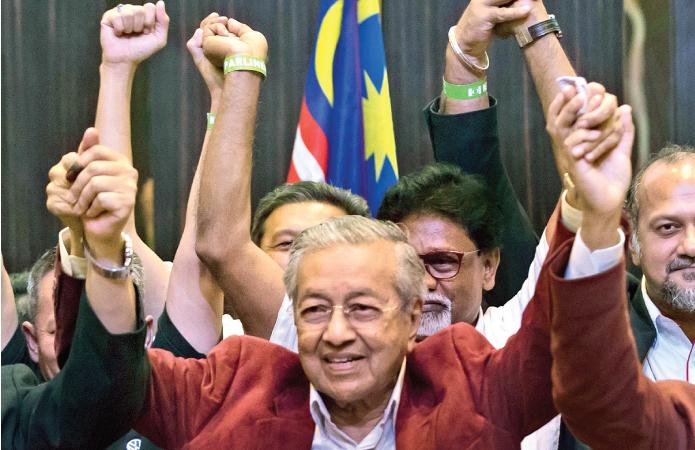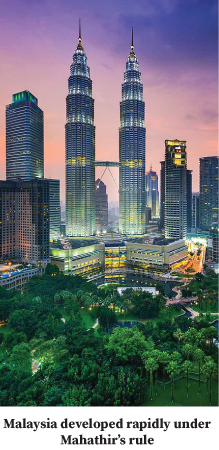
Malaysians woke on Thursday to the shocking news that former Prime Minister Dr. Mahathir Mohamad had kicked his one-time protégé Najib Razak out of office, ending six decades of dominance by the ruling coalition. “I am 92 going on 93,” Mahathir said in January. “I won’t last long and I am prepared for that. But for as long as I can contribute, I will continue”.
At 92, Mahathir is the world’s oldest serving leader, 21 years older than US President Donald Trump and nearly twice the age of Canadian Prime Minister Justin Trudeau. The record was held until recently by Zimbabwe leader Robert Mugabe, who was forced to quit at 94 in an internal power struggle.
Supporters waved flags and cheered outside the Istana Negara palace in the capital, Kuala Lumpur, as Dr. Mahathir, who previously served as prime minister for 22 years, took oaths once again. The ceremony took place at 9.30pm after a day of political drama. “We are not seeking revenge, we want to restore the rule of law,” Mahathir told reporters, as he declared victory.
Dr. Mahathir has said he will overturn a controversial 6% goods and services tax, which has been widely blamed for rising living costs, which has counted as a black mark against the government. He has also promised a return to fuel subsidies.
A former physician, known as “Dr. M” by the public, Mahathir joined the United Malays National Organization (UNMO) in 1946, just over a decade before the country gained independence. UNMO became the dominant party in the Barisan Nasional (BN) coalition which ruled for six decades.
Mahathir himself was responsible for much of that dominance, as strongman leader of the Barisan Nasional coalition during his 22 years in power from 1981 to 2003. He stepped aside for his anointed successor Abdullah Ahmad Badawi, though he later criticized him.
Mahathir was credited with turning Malaysia into a major trading and economic force in Southeast Asia, though it did not attain the status of South Korea and Singapore and is still classified as a developing country. Under his rule, Malaysia became an investment and industrial hub that gave rise to two indigenous car brands – Perodua and Proton, which was created (and initially chaired) by Mahathir himself. (Today, China’s Geely owns nearly 50 percent of Proton shares). Another of Mahathir’s pet projects was the Petronas Towers, once the world’s tallest, which have become instantly recognizable Malaysian icons.
Mahathir who last left politics in 2003, was inspired by and is often compared to, the late Lee Kuan Yew who transformed neighbouring Singapore from a sleepy backwater to a major global financial powerhouse. The two men were good friends throughout their governing and retirement years. Taking a leaf from Singapore, Mahathir will want to raise Malaysia’s profile on the international diplomatic stage. At the moment neighbouring Singapore has become a more prominent player on the world stage – in fact, the upcoming historic summit between US President Donald Trump and North Korea’s Supreme Leader Kim Jong-un will be held in June the tiny city state.
Mahathir also had a special place in his heart for Sri Lanka and visited the island several times, including after retiring from politics. He watched with dismay as Sri Lanka slid into internecine chaos and took steps to ensure communal harmony in Malaysia, which has a large ethnic Tamil population. Malaysia has become one of Asia’s most vibrant multi-ethnic, multi-cultural countries.
Though he seemingly retired from politics for nearly 15 years, he was always in the limelight and it became apparent that politics would always be his true calling. He returned to the field this year, determined to oust incumbent Prime Minister Najib. Mahathir told the media that standing in the election was a “job I have to do”.
“I cannot accept this country being destroyed by selfish people who only think about themselves ... who steal money,” he said, referencing the 1MDB corruption scandal which has dogged Najib’s premiership.
Officials say that between 2009 and 2015, more than US$ 3.5 billion was apparently misappropriated by high-level officials of the 1MDB board. It has been alleged that Najib himself was responsible for the loss of US$ 700 million of those funds. However, the former prime minister has consistently denied any wrongdoing and has been cleared of any offence by Malaysia’s attorney general. Mahathir’s win indicates a mood for change, following the “Malay tsunami” in which many ethnic Malay voted for the opposition for the first time. In fact, the opposition led by Mahathir took many states that were considered Najib’s BN strongholds such as Johor, Malacca and Negeri Sembilan. Another significant feature was the higher participation youth, who mobilized social media to swing the vote in Mahathir’s favour.
 With Najib’s most potent rival, former Deputy Prime Minister Anwar Ibrahim, behind bars after being convicted on corruption and sodomy charges, the opposition was looking weak going into the election. Then Mahathir stepped in, saying he didn’t mind “being used by the opposition” to oust Najib who had been widely expected to lose the popular vote but to win the most number of seats in Parliament in a first-past-the-post system that opponents claimed was weighted in favour of his ruling BN coalition. Mahathir led the “Pakatan Harapan” (Alliance of Hope) coalition which eventually snatched victory.
With Najib’s most potent rival, former Deputy Prime Minister Anwar Ibrahim, behind bars after being convicted on corruption and sodomy charges, the opposition was looking weak going into the election. Then Mahathir stepped in, saying he didn’t mind “being used by the opposition” to oust Najib who had been widely expected to lose the popular vote but to win the most number of seats in Parliament in a first-past-the-post system that opponents claimed was weighted in favour of his ruling BN coalition. Mahathir led the “Pakatan Harapan” (Alliance of Hope) coalition which eventually snatched victory.
“Najib has made Malaysia among the 10 most corrupt countries in the world and we have evidence to show, evidence that he has covered up under the Official Secrets Act and banned people from talking about [it]. He’s using money to buy up people. He told me himself that ‘cash is king’, told me that with that ‘with money I can do whatever I like’,” Mahathir told reporters a few days before the election.
Mahathir says he would step aside in Anwar’s favour after securing his former rival a royal pardon, paving the way for him to serve as prime minister. Mahathir’s embrace of Anwar Ibrahim has surprised Malaysians. When Mahathir was prime minister in the 1990s, Anwar was jailed on sodomy and corruption charges that critics said were politically motivated. Anwar remains imprisoned after being found guilty of sodomy a second time in 2015 under Najib. He is expected to be released in June, after serving the bulk of the sentence. Anwar’s wife, Wan Azizah, endorsed Mahathir despite his earlier actions. She served as his deputy in the coalition to oust Najib. She was one of the dozens of opposition candidates elected Wednesday.
Mahathir faces many challenges in the next few years and has rightly identified the economy as a major priority. Malaysia’s economy is enjoying strong growth at the moment, surging to 5.9% last year and forecast by the Malaysian Central Bank to reach 6% in 2018. The Ringgit is the best-performing currency in emerging Asia this year, strengthening 2.5% against the US Dollar. Most of that recovery has come due to stronger global trade and rising domestic demand. It remains to be seen how Mahathir’s more populist pledges such as abolishing the Goods and Services Tax (a move which is said to cost the economy more than US$ 100 billion) will impact on the economy. Mahathir has also vowed to reclaim the stolen 1MDB money and fast-track development in the rural districts, including those in the island of Borneo, which is shared with Indonesia and Brunei. Despite his advancing years, Mahathir could be just what the doctor ordered to cure the ills facing Malaysia.
